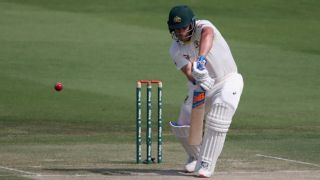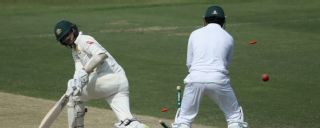|
For a stadium in the middle of the UAE desert, some 12,000 km from Sydney and Melbourne, there was an awful lot familiar to Australians on the second day in Abu Dhabi. On the public address system was a playlist of pub rock hewn straight out of FM radio, from AC/DC, Midnight Oil and Powderfinger, to the inescapable strains of Darryl Braithwaite and Jimmy Barnes. Underfoot was a pitch still with a smattering of live grass, enough for seamers and spinners to gain deviation and pace from if good enough. And on the scoreboard was an Australian Test team producing a substandard first innings for the fifth match in a row. Unsurprisingly, none of them has ended in victory. While the Dubai version, losing 10 for 60 having been 0 for 142, was more dramatic, the steady slide to 145 here answered one question left hanging after the first Test: how would this lineup fare on days when Usman Khawaja goes cheaply? His early exit on the first evening, to a leg-side strangle caught wonderfully by Sarfraz Ahmed, gave Pakistan their opening, and further clarified the gulf left by the banned Steven Smith and David Warner. Aaron Finch continued to make a useful fist of his delayed start to Test cricket before being successfully worn down for the third time in as many innings, but the rest fell swiftly and in fashions that were largely reminiscent of the sorts of challenges faced by batsmen in Australia. In the right hand of the wonderfully skillful Mohammad Abbas, the red Kookaburra ball nibbled a little bit each way off the aforementioned live grass, with enough carry to result in Shaun Marsh and Travis Head falling to the first two slips catches off the pacemen for the series. Flung from the cocked wrist of Yasir Shah, the same ball bounced and turned just enough to ensure the vice-captain Mitchell Marsh's open bat face offered another catch to slip. All dismissals might have taken place as readily in Adelaide as Abu Dhabi, something further underlined by how Nathan Lyon had utilised top spin on the first day. Another experienced member of the Australian attack, Peter Siddle, will wonder why he was unable to be as effective as Abbas. In some ways, the conditions the Australians faced were a long way from those they had spent two weeks preparing for at the ICC Global Academy in Dubai. Certainly, the grass on the surface had caused the captain Tim Paine and the tour selectors Justin Langer and Trevor Hohns enough pause to wait until match day before deciding to keep the same XI they had fielded in the first Test. Batsmen who had trained for reverse swing, low bounce and slow turn found nothing of the sort here, particularly in the morning session, when overnight dew appeared to both liven up the surface and slow down the outfield. But that same grass and moisture is far more common to cricket in Australia than in Asia, meaning that the touring team should have gained some sort of advantage from them. And perhaps they would have, without another example of an endemic problem in terms of batting quality when confronted with high-class performers from around the world. When he was quizzed about Australian batting collapses in the wake of the Dubai escape, the assistant coach Graeme Hick had pointed out that while starting an innings was difficult in Asian climes, this team's problems with losing wickets in a rush was far from a problem confined to this part of the world. "I'm not saying we've only had collapses in the subcontinent. It's been pretty rife." That rifeness, which included seven instances of 10 wickets falling for fewer than 100 runs in the little more than two years since the 2016 tour of Sri Lanka, has also featured another more recent trend, stretching back to the start of the fateful South African tour. Since the first Test of the series in Durban, Australia's first-innings tallies have been 351 in 110.4 overs, 243 in 71.3 in Port Elizabeth, 255 in 69.5 in Cape Town, 221 in 70 in Johannesburg, 202 in 83.3 in Dubai, and now 145 in 50.4 in Abu Dhabi. Even including Kingsmead, that means a rounded average of 236 per innings. Over the long and eventful history of Test cricket, the average first-innings score by winning teams is 376. In Asia, it is higher still, at 388. Either way, the Australians have fallen well short of the mark, and they started doing so at the time a mentally and physically fatigued Smith and Warner began dropping off from the sort of productivity the rest of the team had become used to. With no prospect of recalling either until April next year, the spotlight is then left upon the rest who, apart from Khawaja, look either to be still developing or struggling to match the required standard.  "I think that first innings is always key to set up the game," Finch said. "We've seen Pakistan in the first Test go really big in the first innings and that gives them freedom in the second innings to play as aggressive as they want or as conservative as they want and then the game's in your hand. You can pull out when you want and declare. Same again in this game, we've left ourselves a little bit too far behind the game.
"I think that first innings is always key to set up the game," Finch said. "We've seen Pakistan in the first Test go really big in the first innings and that gives them freedom in the second innings to play as aggressive as they want or as conservative as they want and then the game's in your hand. You can pull out when you want and declare. Same again in this game, we've left ourselves a little bit too far behind the game.
"So as soon as [Fakhar] Zaman comes out and plays aggressively and takes the game away in a few overs, then all of a sudden you're unsure whether to keep your catchers in or retreat and try to control the scoreboard. That's the beauty of going big in your first innings, you control the game. It goes a long way to winning games. Traditionally, wickets do get harder and harder to bat on, so we've probably left ourselves a little bit too much work to do at the back end of games in the past, which no doubt we'll address and, hopefully, going forward we can keep improving on that." For Langer, in particular, this will mean a few searching questions about several of the players he has identified as critical to the intervening months, none more so than Shaun and Mitchell Marsh. In the corresponding six Tests, they have cobbled their runs at averages of 14.27 and 18.27 respectively, with the younger brother's 96 at Durban the only score beyond 50 for either. It was a statistic about reaching scores above 30 that caused rumbles following the selection of Australia's Test squad, but another at the international level places the Marsh brothers in still harsher light. Among all players to have played Tests for Australia since 2011, Mitchell Marsh (42%) and Shaun Marsh (38.98%) both make the top five in terms of highest percentage of single-figure scores in that time. By comparison, Smith (22.02%) and Warner (21.17%) round out the top 10 despite being the only two players to have compiled more than 100 innings over the same period. The boom-or-bust nature of these figures will beg the question of whether Australia, with the team's current profile, can sustain such inconsistency in the hope that the big innings Shaun and Mitchell Marsh do occasionally provide will result in victories. On commentary, Mike Hussey suggested that Shaun Marsh may be better suited to No. 5, where he batted successfully during the Ashes last summer, and Mitchell Marsh to No. 6 - both positions, of course, were theirs in a world where Warner was opening and Smith was No. 4. For the remainder of day two, there were more wearyingly familiar sights and sounds for Australians - the bowlers in particular. Mitchell Starc, clearly sore and stiff from his exertions already in the series, could manage only one spell with so little recovery time, while Pakistan took progressively more liberties with Siddle. Lyon and Jon Holland bowled decently, but without any scoreboard pressure to help them. And Marnus Labuschagne was unable to repeat the breakthroughs of day one. Another tune had rung throughout the stadium during the lunch break, at a time when the Australians had already given up their first-innings advantage. It was Holy Grail by Hunters and Collectors, beloved by the producers of sporting montages but actually a rather downbeat set of lyrics about the abortive retreat of Napoleon's army from Russia in 1812. In the familiar hole the Australians found themselves in, they could reflect on the song's bridge: I've been searching for an easy way, to escape the cold light of day; I've been high, and I've been low, but I've got nowhere else to go...
|

